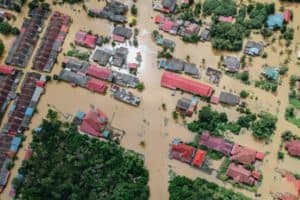This page contains affiliate links. This means if you a follow a link and make a purchase, at no additional cost to you, Humanitarian Careers will receive a commission. Thank you for supporting the site.
Hundreds of billions of dollars a year is spent on international development projects. These programmes aim to help people in poorer countries by increasing economic and human development. However, although there has been success in recent decades in reducing global poverty, many argue that international development is ineffective and actually overly complex. But why? What makes international development so complicated? Let us explain…
Government Authorities Can Make Development Difficult
A first reason why development is complex is because government authorities often frustrate development efforts.
When international organisations, such as the UN or NGOs, launch development projects, they need to work in close collaboration with national and local governments. Development projects often require specific government approvals. Many governments also put conditions on development projects, such as how many local staff should be hired and how finances are controlled.
The high levels of government involvement in many development projects adds significantly to their complexity.
As well governments regulating development projects, which in many cases is legitimately within their remit, development work can be made more complex by governments deliberately interring in efforts.
Many governments use their authority to try and direct development projects towards areas where they receive significant support, and away from communities that may be in opposition to them. This is another factor that adds to the complexity of international development work.
Development Agencies Must Often Work In Post-Conflict Zones
A second reason why international development is complex is because many development organisations operate in areas that recently experienced conflict.
When conflicts are ongoing, humanitarian aid is delivered to meet people’s immediate needs. Once the fighting is over, development work begins to try and improve the living standards of affected people and address the root causes of the conflict. However, working in a post-conflict setting poses a range of complications that often hinder development work.
Areas recently hit by conflict often have damaged infrastructure, making implementing development projects difficult. Conflict affected communities also often have deep rifts and extensive traumas, which make implementing development programmes more complex. Many people flee during fighting and are unwilling to return, making hiring qualified staff to run development projects another challenge. There is also the risk of the conflict resuming, which adds to the complexity of running many development projects.
Post-conflict settings are some of the areas most in-need of development work. However, they are also some of the most complex contexts for development agencies to operate in.
Development Projects Have Significant Risk Of Corruption
A third reason why development work is complicated is because there is a high risk of corruption.
Many of the poorest countries in the world are also the most corrupt. This means development organisations must operate in areas where corruption and nepotism are endemic. In order to ensure that funds and resources are used to achieve development aims and are not siphoned off, strict controls must be put in place. Ensuring that corruption does not impact development projects is a major factor in making them complex.
Sadly, although great efforts are often made to reduce corruption in development programmes, finances and materials are still lost to corruption on many development projects. This makes them more costly to complete, adding to the money, resources and time needed to set-up, run and complete development works. The impact of corruption of development projects further adds to why they are complicated to run.
The combination of avoiding corruption within development projects, combined with the inevitable impacts of fraud within many development organisations, is a major reason development projects are difficult to implement.
Much Development Work Lacks Localisation
Another reason why development is complex is because many development projects lack localisation.
In the humanitarian and development industry, localisation is the practice of giving more power, funding and materials to organisations and people local to the issues being addressed.
The model of the international development sector for decades has been development organisations, often based in the West, managing projects aiming to resolve issues in poorer countries. This has meant everything from senior staff being Western expatriates, to large donors giving the majority of their funding to big international NGOs. This lack of localisation has contributed significantly to the complexity of doing development work.
Local people know how to best help themselves and their communities. They are closer to local networks, better understand local issues and more easily anticipate issues that may arise. They also better understand local customs, and what beneficiaries of a development project expect from its outcomes.
Although development agencies are making efforts to better embrace localisation, so far there has only been limited tangible successes. This needs to change if development work is to become simpler to do.
International Development Online Courses
If you want to know about why development is highly complex, we recommend taking an online short course. We think the Management of International Development: Towards Agenda 2030 course is great. It looks at the current international development model as well as the trends that will be key to global development in the near future. Follow the link to the course’s page for more information.
We also think the online course Sustainable Development in the 21st Century by Yonsei University to be one of the best for those interested in international development. Delivered by former UN Secretary General Ban-ki Moon, the online course would be a great addition to the CV of anyone interested in how countries develop. The link is to the course’s page.
If you are interested in the practical methods used on international development projects, we recommend the online course How To Design & Fund International Development NGO Projects. The course teaches students the tools needed to establish and run impactful development projects. Click the link to visit the course’s page for more information.
Development Work Is Done In Highly Changeable Contexts
One major reason why development is so complex is because the contexts which development projects are run are highly changeable.
There are many factors that can affect the successful implementation of a development project. Development projects are specifically ran in areas where there is a great social need. However, this inevitability means there is often a high degree of instability. As a result, the contexts that development projects operate in can alter swifty. This is perhaps one of the biggest factors that makes international development so complicated.
Development organisations must be able to adapt their projects as contexts change. However, there are many types of development projects – such as infrastructure building, that cannot be quickly altered if the political, economic or conflict condition changes suddenly. As a result, development programmes are always at risk of being lost by situational changes and this adds to the complexity of international development work.
Development Funding Is Often Inconsistent
An often-cited reason why development is extremely complicated is because the funding for development projects if often inconsistent.
Although implemented by a range of agencies and NGOs, in fact almost all development projects are funded by large donor organisations. There are inter-governmental bodies, such as the UN and EU, as development donors, as well as many national governments that run dedicated development funding departments.
An advantage of large development donors is that they can provide significant financial resources to support international development work. However, they actually can also add to its complexity.
Development organisations that rely heavily on large donors must constantly apply for new rounds of funding, directing resources away from frontline development work. These organisations also lack independence, having to work mainly on projects that large donors choose to fund. Both of these factors add to the complexity of often achieving positive development outcomes.
Development Workers Face Competing Priorities
A final reason why development work is complex is because there are many competing priorities.
It is impossible to respond to every development need. With 698 million people living in extreme poverty globally there is simply not the capacity to provide quality development programmes everywhere.
Even within specific countries, development needs may extend across a range of issues – from clean water to poor housing, from a lack of education for children to limited healthcare for older people. On top of this, many of these issues intersect, meaning that attempts to assist a community in one area are hampered by a lack of development in another. The huge range of competing, and intertwined, development needs, is a major factor in why it is so complex.
Although development organisations and donors work hard to prioritise development projects and funding, the fact that different development needs must be prioritised makes the work highly challenging. Development priorities may even change as some issues are resolved and new ones come to the forefront.
The fact that development workers almost always face competing priorities is an often-cited reason why the work is so complicated.





